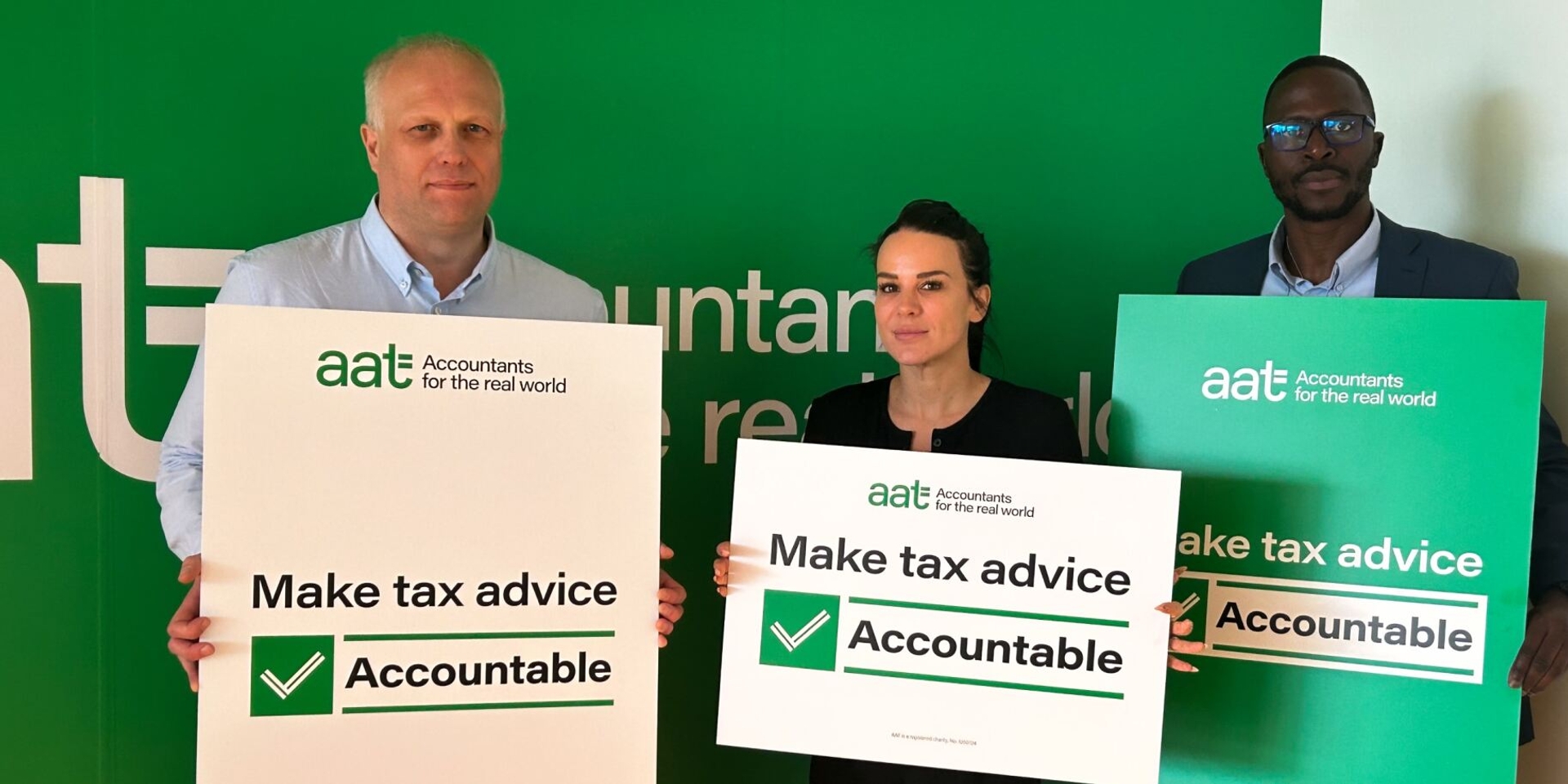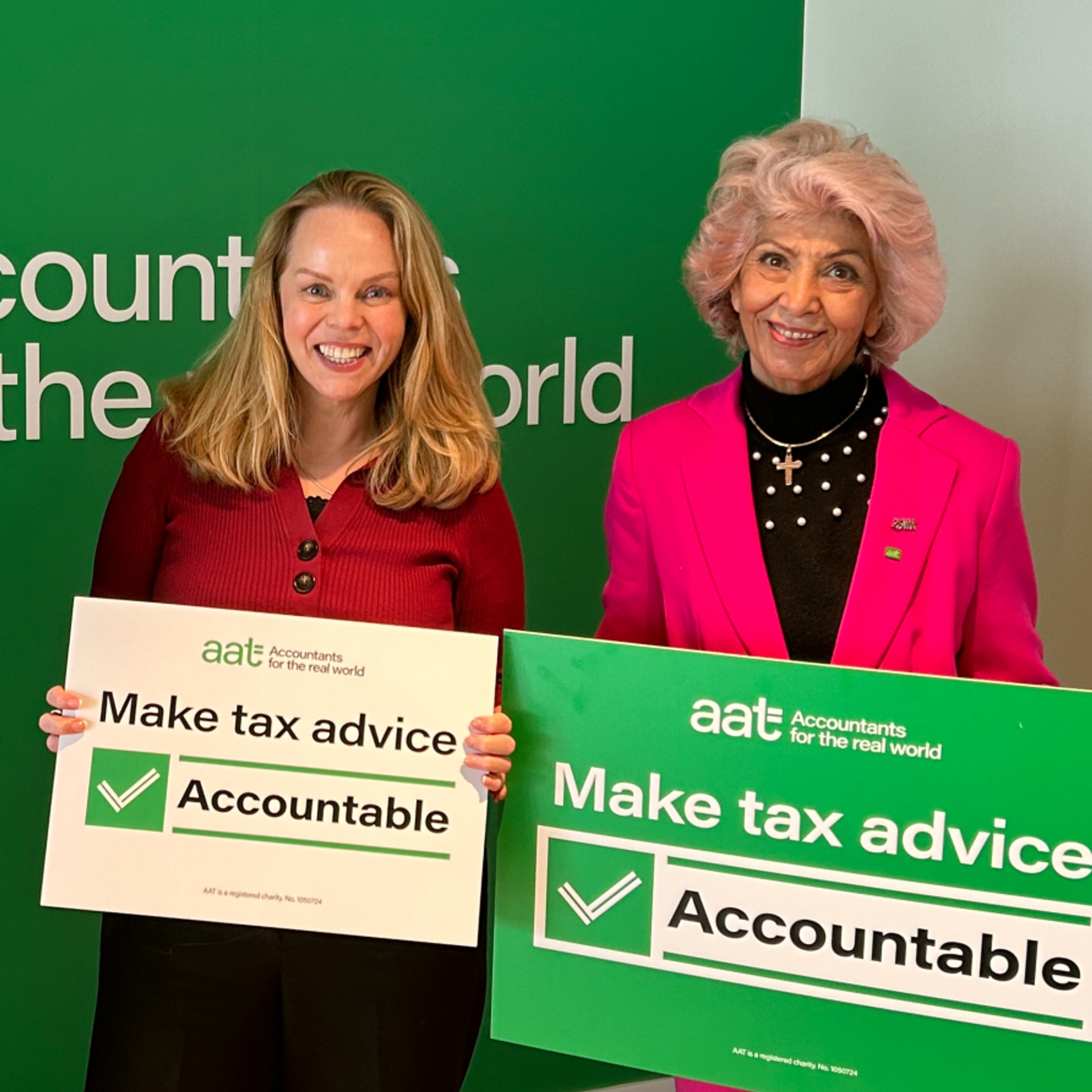Once-in-generation opportunity to fix tax advice market
29 May 2024

29 May 2024, London – The Association of Accounting Technicians (AAT) has responded to HMRC’s long-awaited consultation on “Raising standards in the tax advice market”, which closes for submissions today.
HMRC has asked the industry and consumers for their views on how best to tackle what it calls significant levels of substandard tax advice in the market wherein a “minority of practitioners who are incompetent, unprofessional or unscrupulous who continue to operate, harming their clients and the public finances”. AAT has more than 50,000 accounting technicians, bookkeepers and licensed accountants, 85% of whom provide some kind of paid-for tax advisory services alongside accountancy.[1] Its members collectively serve more 840,000 small businesses in the UK.[2]
“This is a once-in-generation opportunity to fix the unregulated areas of the tax advice market.” said Adam Harper, AAT’s Director of Policy, who has been leading AAT’s campaign on the tax advice market for more than 14 years.
“Unlike most developed nations, someone in the UK does not have to be appropriately qualified or be a member of professional body in order to practice as a tax adviser. This lack of regulation has led to varying levels of service quality and, in the worst cases, financial disaster for both individuals and small businesses.”

“Some unaffiliated tax practitioners are providing substandard advice and services to their clients, damaging the reputation of the wider profession. There is also a general lack of awareness and understanding that the market is unregulated. Many taxpayers suffer from the misconception that all tax practitioners will be suitably qualified, so don’t think to ask the right questions at the point of engagement.”
“It’s this simple: every tax adviser should have the knowledge, support and oversight needed to meet minimum professional standards. The best way to ensure that advisers consistently meet those standards is through mandatory membership of bodies like ours”.
“As a profession, we care about our good name. We care about professional standards and consistent oversight. That’s why we need to be at the heart of the regulatory solution.”
The revenue service, which has been considering three options during the consultation, will be providing its advice to the incoming government in just a few weeks. AAT argues strongly for Option 1 - mandatory membership of professional bodies, as the most effective way of raising standards without incurring substantial cost to the taxpayer.
The other possible models include: 2. joint government-industry enforcement – what HMRC calls a ‘hybrid model’ – and 3. direct government supervision with taxpayers bearing 100% of the cost.
AAT has been actively engaged on the issues stemming from poor quality advice in the tax market for many years, proposing solutions to government – most recently though its widely-praised ‘Accountable’ campaign. A poll of lawmakers by YouGov in 2022 found 82% of MPs agreed that anyone employed to provide tax and accountancy services should be professionally qualified.[3]
Why mandatory membership of professional bodies is required:
- No requirements of technical competence to practice - currently tax practitioners can enter the market without demonstrating minimum standards of competence.
- No general deterrents for dishonest practitioners operating in the market - any AAT member who falls short of standards of professionalism will be subject to its disciplinary process, which leads to sanctions where appropriate, including expulsion. For tax practitioners who are unaffiliated, there are no such deterrents.
- Disjointed monitoring and enforcement - there is little or no systematic monitoring of, or enforcement action taken against, unaffiliated tax practitioners.
- Taxpayers are unable to easily assess the competence of tax practitioners – many clients don’t know how to establish the level of qualification and experience held by tax practitioners or know where they could verify those details should they ask for them.
Sarah Beale, AAT Chief Executive Officer, said:
“To protect consumers and small businesses, urgent reform is needed to make the tax advice sector more accountable.”
“Mandating membership of a professional body would align training, with professional standards and with consistent oversight. When clients encounter a level of service that is unacceptable, they will then be able to approach the relevant professional body to seek action.”
“This is about making all tax practitioners accountable, some of whom are currently operating outside enforceable professional standards. If HMRC adopted Option 1, then both the public and the tax profession stand to benefit from the level playing field mandatory membership would provide.”

Beale continues: “AAT has a proud record of driving high standards in the accountancy sector. Part of our success has been in working with practitioners to lift performance where it has fallen short, providing the professional development and upskilling opportunities for them to raise their game and rise to public expectations.”
Beale said it was HMRC’s interests to work with professional bodies to drive up standards in the sector.
She pointed to the 45% (£16bn) share of the annual ‘tax gap’ HMRC attributes to taxpayer error and failure to take reasonable care, as an area that professional bodies could assist with if mandatory membership and supervision was introduced.[4] The gap refers to the difference between what the government should be collecting on paper every year and what it actually does. AAT is of the view that many errors stem from poor advice.
Beale continues: “AAT has a proud record of driving high standards in the accountancy sector. Part of our success has been in working with practitioners to lift performance where it has fallen short, providing the professional development and upskilling opportunities for them to raise their game and rise up to public expectations.”

Context: The very real impact bad tax advice has on small businesses
The impact of bad accounting advice has a very real impact on small businesses. Laura White FMAAT and AAT licensed member, shares how her client has been left teetering on the edge of bankruptcy.
“A client, who owns a physical shop, came to us after receiving poor accountancy advice which has left him owing HMRC tens of thousands of pounds in VAT and close to bankruptcy.”
“His previous accountant advised him that he didn’t need to keep sales, invoice or receipt records, which is completely wrong. Without any records, he has no way of knowing which sales he owes VAT on and which are exempt. He has been left having to pay full VAT on his income with no allowable reduction, leading to a bill he can’t afford.
“He is in his 60’s and has drawn out his pension which has cleared some of the debt, but it has left him in a position where he can’t retire. He is currently going through an IVA (Individual Voluntary Arrangement) which is the step before bankruptcy. He is a hard-working man, who unfortunately received really bad advice which has had a devasting impact.”
Context: Industry support for regulation and affiliation
A new survey by the professional body shows widespread worry amongst accountants regarding unregulated tax advisers. Of the 520 affiliated accountants who responded:
Almost three quarters (74%) expressed concern that consumers were being given poor quality advice.
- 62% were concerned clients would be issued fines from HMRC as a result.
- 67% agreed that the reputation of all accountants was being harmed by the levels of poor-quality tax advice.
- 88% of accountants thought establishing minimum standards for tax advisers was important to raise trust and professionalism in the sector.
- 91% wanted consistent professional standards, ethics, and oversight adhered to.
- 85% were in favour of affiliation as a requirement to practice for all tax advisers.
Notes to Editors:
- AAT spokesperson Adam Harper is available for an interview on request.
- Copies of AAT’s full submission will be available on request.
More information:
- AAT policy brief: It's time to make tax advice accountable - Raising standards in the tax advice market (2024) (PDF)
- FAQs: Mandatory membership of professional bodies for all paid-for tax advisors (2024) (PDF)
- HMRC’s consultation documents can be found here on gov.uk
About AAT:
- The Association of Accounting Technicians (AAT) is the voice of the accounting technicians and bookkeepers in the UK.
- AAT is made up of more than 120,000 people passionate about accountancy – including more than 50,000 accountancy and finance professionals working in the sector and running their own practices.
- AAT members grow local communities: powering more than 840,000 small businesses and local authorities in the UK with the practical accounting skills and valuable financial insights they need to invest and grow.
- Formed in 1980 with the purpose of raising professional standards and expanding access to quality accountancy education and skills training, the charity’s open-access qualifications can be life-changing.
[1] AAT membership data (April 2024) – ‘Proportion of AAT professional licensed members offering one or more tax services’
[2] Ibid., (May 2024)
[3] YouGov (2022) – independent research commissioned by AAT. House of Commons representative sample of one hundred MPs weighted for party, gender, electoral cohort, geographic variance. Fieldwork undertaken 7–30 June 2022.
[4]HMRC (2023): Measuring tax gaps 2023 edition: tax gap estimates for 2021 to 2022. www.gov.uk/government/ statistics/measuring-tax-gaps
